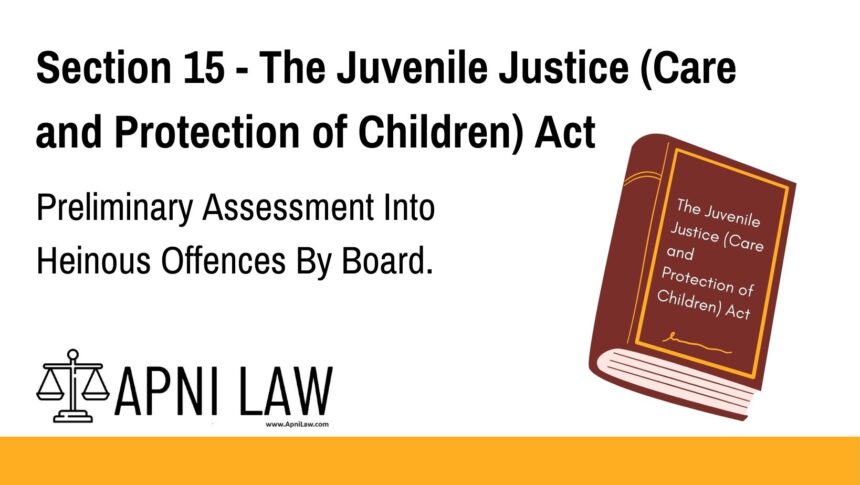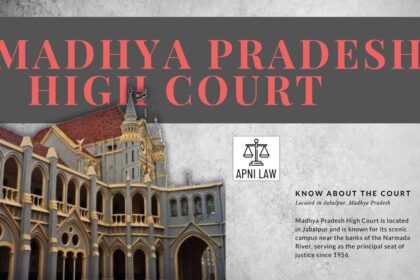Code
(1) In case of a heinous offence alleged to have been committed by a child, who has completed or is above the age of sixteen years, the Board shall conduct a preliminary assessment with regard to his mental and physical capacity to commit such offence, ability to understand the consequences of the offence and the circumstances in which he allegedly committed the offence, and may pass an order in accordance with the provisions of sub-section (3) of section 18:
Provided that for such an assessment, the Board may take the assistance of experienced psychologists or psycho-social workers or other experts.
Explanation.—For the purposes of this section, it is clarified that preliminary assessment is not a trial, but is to assess the capacity of such child to commit and understand the consequences of the alleged offence.
(2) Where the Board is satisfied on preliminary assessment that the matter should be disposed of by the Board, then the Board shall follow the procedure, as far as may be, for trial in summons case under the Code of Criminal Procedure, 1973 (2 of 1974):
Provided that the order of the Board to dispose of the matter shall be appealable under sub-section (2) of section 101:
Provided further that the assessment under this section shall be completed within the period specified in section 14.
Explanation
Section 15 empowers the Juvenile Justice Board (JJB) to carry out a preliminary assessment when a heinous offence is alleged against a child who is 16 years of age or older. This is not a trial, but a process to evaluate the child’s:
-
Mental and physical capacity to commit the offence.
-
Understanding of the consequences.
-
Circumstances under which the offence was committed.
If, based on this assessment, the Board believes the child should be tried as an adult, it may pass an order accordingly under Section 18(3). If not, the Board continues with regular juvenile proceedings.
The assessment may involve expert opinions (psychologists, social workers, etc.), and must be completed within the timelines prescribed under Section 14 (i.e., within 3 months).
Illustration
Example:
Siddharth, a 17-year-old boy, is accused of committing a heinous offence (e.g., armed robbery or rape). As required under Section 15, the Juvenile Justice Board conducts a preliminary assessment involving a psychologist and a social worker.
They assess whether Siddharth had the mental and physical capacity to understand his actions and the impact they would have. If the Board concludes he comprehended the consequences and committed the crime in full awareness, it may decide he should face trial as an adult under Section 18(3).
If, however, Siddharth is found to lack that maturity or capacity, the case continues under the juvenile justice framework.
Common Questions & Answers
Q1: What is the purpose of the preliminary assessment?
A: To determine whether a child aged 16 or older, alleged to have committed a heinous crime, should be tried as an adult based on mental and emotional maturity.
Q2: Is the preliminary assessment a trial?
A: No. It is expressly stated to not be a trial, but a capacity assessment.
Q3: Who can assist the Board in conducting this assessment?
A: The Board may seek assistance from psychologists, psycho-social workers, or other qualified experts.
Q4: Can the decision of the Board be appealed?
A: Yes. The Board’s order to dispose of the matter itself (i.e., not transfer to Children’s Court) is appealable under Section 101(2).
Q5: What is the time limit to complete the preliminary assessment?
A: It must be completed within three months from the date of first production of the child before the Board, as per Section 14.
Conclusion
Section 15 of the Juvenile Justice Act represents a crucial balance between rehabilitation and accountability in juvenile law. It acknowledges that some children over 16 may commit heinous crimes with full awareness and intent, warranting an adult trial. However, the provision also protects those whose actions stem from immaturity or vulnerability by ensuring a detailed and compassionate psychological evaluation.
By introducing the concept of a preliminary assessment and involving mental health professionals, the law injects psychological sensitivity into the justice process—marking a progressive step toward contextual, fair, and individualized justice for children.








